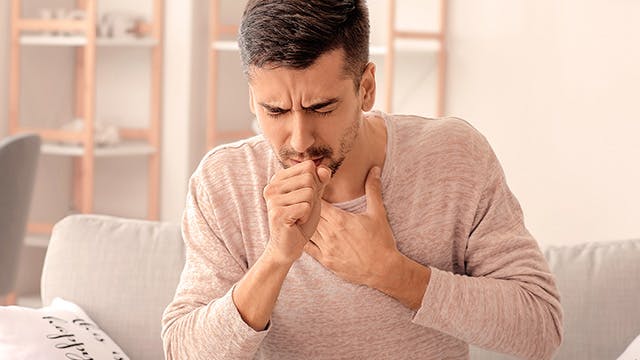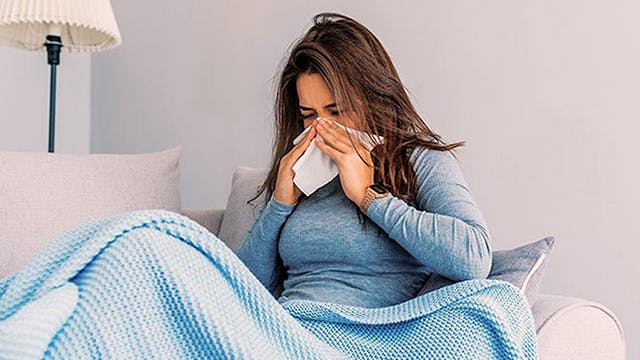What Causes Sinus Pressure?
Depending on the cause of your sinus pressure, the way you treat your symptoms will look differently. If you experience sinus pressure, it’s most likely caused by sinusitis. Sinusitis means your sinuses are inflamed. Often, sinusitis is caused by a bacterial infection, but it can also be caused by a cold, nasal problems, or even allergies.1
Your paranasal sinuses are the hollow air spaces within the bones of your face surrounding your nose.2 Mucus leaving the frontal sinus, behind your forehead, and your maxillary sinuses, behind your cheeks, drain through the ethmoid sinuses behind the bridge of your nose.2 If your nose is swollen, your sinuses can be blocked, causing pressure and pain.1 When the sinuses in your nose become blocked, your other sinuses are likely to also become clogged, which is why you feel sinus pressure in different parts of your face.2 Other symptoms that may accompany your sinus pressure include fatigue, cough, congestion, and postnasal drip.1
If your symptoms are severe and last for more than a week, you should talk to your healthcare provider. Based on your symptoms and looking at your nose, they will have a better idea of what is causing your sinus pressure. If you have bacterial sinusitis, you may be prescribed an antibiotic.2
How to Relieve Sinus Pressure
If you’re suffering from sinus pressure, here are some of the best ways to get sinus pressure relief:1,3,4
- Over-the-counter nasal decongestants. Over-the-counter nasal decongestants can be a great option for treating sinus pressure. Nasal decongestants reduce the swelling of blood vessels in your nose, relieving congestion and easing sinus pressure.
- Over-the-counter pain relievers. If your sinus pressure becomes painful, over-the-counter pain relievers can also provide relief. Many medications intended to target sinus congestion contain acetaminophen for pain relief.
- Saline nasal spray. Spray into your nose a few times a day to rinse and moisten your nasal passages.
- A warm compress. Using a warm compress over your nose and forehead can help relieve sinus pressure.
- Moist air, steam and vapor. Add hot water to a bowl of water, drape a towel over your head, lean over the bowl and breathe in the vapor. You can also take a hot shower and take in the warm, moist air to help ease your pressure and encourage mucus drain.
- Nasal corticosteroids. These nasal sprays are designed to help relieve pressure in your sinuses by decreasing the inflammation.
How to Prevent Sinus Pressure
If you’re prone to experiencing congestion or sinus pressure, there are steps you can take to prevent your nasal passages from being blocked.
- Rinse your nasal passages. Run water gently into the nasal passages to help clear excess mucus and moisten membranes. You can use a specially designed squeeze bottle or neti pot.3
- Stay hydrated. Good hydration helps keep the mucus thin and loose.
- Avoid dry environments. Keeping a humidifier in your home can help prevent your nasal passages from drying out.
- Elevate your head. When laying down, mucus pools in your sinuses. Propping your head up with pillows can help.
- Avoid smoky or polluted air. Tobacco smoke and other air pollutants can irritate and inflame your lungs and nose, causing sinus pressure.
- Take allergy medications. If your sinus pressure is due to allergies, take your allergy medication regularly to help relieve your symptoms.
- Rest. Getting plenty of rest helps your body fight off infection and speeds recovery.3
- Use a humidifier. If your home has forced air heat, your nasal passages may be dry. Add a humidifier to your space to keep the air moist and prevent nasal pressure. Don’t forget to clean the humidifier regularly to prevent mold.4
Even though your sinus pressure will likely go away on its own, there are ways to make the pain and discomfort more bearable. For a remedy that treats nasal and sinus congestion and pain, try Theraflu Day/Night Cold and Flu Hot Liquid Powder Value Pack. Dissolve the powder in hot water for a warm drink that can provide soothing comfort.



